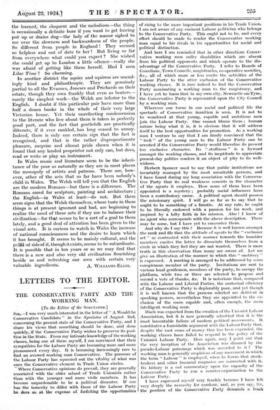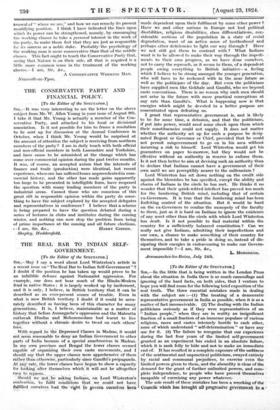LETTERS TO THE EDITOR.
THE CONSERVATIVE PARTY AND THE WORKING MAN.
[To 17w Editor of the SPECTATOR.] was very much interested in the letter of A Would-be Conservative Candidate " in the Spectator of August 2nd, concerning the present state of the Conservative Party, and I share his views that something should be done, and done quickly, if the Conservative Party wishes to preserve its posi- tion in the State. From my intimate knowledge of the working classes, being one of them myself, I am' convinced that their sympathies for the Labour Party are becoming more and more pronounced every day. It is becoming increasingly rare to find an avowed working man Conservative. The pressure of the Labour Party has squeezed out the vitality of what was once the Conservative element in Trade. Union circles. Where Conservative opinions do prevail, they are generally associated with the older school of Trade Unionists rather than with the younger and more virile members. It has become unpardonable to be a political dissenter. If one has the temerity to differ with those of the Labour Party he does so at the expense of forfeiting the opportunities
of rising to the more important positions in his Trade Union. I am not aware of any eminent Labour politician who belongs to the Conservative Party. This ought not to be, and every effort should be made to render the Conservative working man equal to his rivals in his opportunities for social and political distinction.
And here I am reminded that in other directions Conser- vative working men suffer disabilities which are absent from his political opponents and which operate to the dis- advantage of the Conservative Party. I refer to Boards of Guardians, Town Councils, magistracies, co-operative societies, &c., all of which more or less excite the activities of the Labour Party to the utter exclusion of the Conservative working classes. It is rare indeed to find the Conservative Party nominating a working man to the magistracy, and I have yet to learn that in my own city, Newcastle-on-Tyne, the Conservative Party is represented upon the City Council by a working man.
Wherever one turns in our social and political life the spectacle of Conservative inanition is seen. It is not to be wondered at that young, capable and ambitious men join the Labour Party. One cannot blame them ; human nature being what it is, it is obvious that it will address itself to the best opportunities for promotion. As a working man I venture to say that I am firmly convinced that the " trek " of the young men to the Labour Party can be arrested if the Conservative Party would liberalize its present too exclusive character. Its " stuffiness " is a byword amongst the working classes, and its ineptitude to appreciate present-day politics renders it an object of pity to its well- wishers.
Herbert Spencer used to say that public institutions are invariably managed by the most unsuitable persons, and I have found during my long association with the Conserva- tive Party that its real weakness consists in the character of the agents it employs.. How some of them have been appointed is a mystery ; probably social influences have been a contributory cause. A political agent should possess the missionary spirit. I will go so far as to say that he ought 'to be something of a fanatic. At any rate, he ought to be liberally endowed with a passion for his work, and inspired by a lofty faith in his mission. Alas I I know of no agent who corresponds with the above description. There may be some, but I have yet to encounter them.
And why do I say this ? Because it is well known amongst the rank and file that the attitude of agents to the " exclusive set " as contrasted with their manner towards the humbler members excites the latter to dissociate themselves from a circle in which they feel they are not wanted. There is more truth in this observation than many are aware of. Let me give an illustration of•the manner in which this " snobbery " is expressed. A meeting is arranged to be addressed by some conspicuous member of the party. Invitations are sent to various local gentlemen, members of the party, to occupy the platform, while two or three are selected to propose and second a vote of thanks, &c. It is notorious that, compared with the Labour and Liberal Parties, the oratorical efficiency of the Conservative Party is deplorably poor, and yet though it is well known that the persons selected are deficient in speaking powers, nevertheless they are appointed to the ex- clusion of the more capable and, often enough, the more intelligent working man.
Much was expected from the creation of the Unionist Labour Association, but it is now generally admitted that it is the most lamentable failure .of modern political movements. It constitutes a formidable argument with the Labour Party that, despite the vast sums of money that has been expended. the working classes have failed to respond to the policy of the Unionist Labour Party. Here again, may I point out that the very inception of the Association was damned by the
pseudo-Labour patronage which was accorded to it ? The working man is generally suspicions of any movement in which
the term " Labour " is employed, when he learns that stock- brokers and other financial magnates arc connected with it. Its history is a sad commentary upon the capacity of the Conservative Party to run a counter-organization to the Labour Party.
I have expressed myself very frankly because I have felt very deeply the necessity for candour, and, as you say, Sir, the position of the Conservative Party demands a frank avowal of " where we are," and how we can remedy its present mortifying position. I think I have indicated the lines upon which its power can bp strengthened; namely, by encouraging the working classes to take a personal interest in the work of the party, to make them feel that they are just as responsible for its success as a noble duke. Probably- the psychology of the working man is more conservative than that-of the middle classes. This fact ought to teach the Conservative party that, seeing that Nature is on their side, all that is required is a little more common sense in the treatment of the working classes.—I am, Sir, &c., N aceastle-on- Tyne . A CONSERVATIVE WORKING



































 Previous page
Previous page